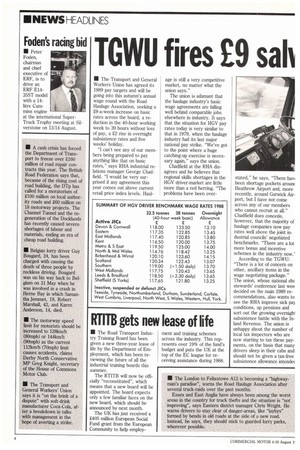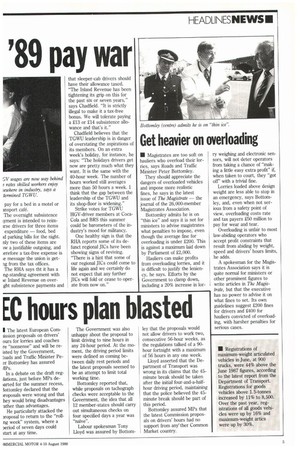TGWU fires £9 sail '89 pay war
Page 4

Page 5

If you've noticed an error in this article please click here to report it so we can fix it.
• The Transport and General Workers Union has agreed its 1989 pay targets and will be going into this autumn's annual wage round with the Road Haulage Association, seeking a 29-a-week increase on basic rates across the board, a reduction in the 40-hour working week to 39 hours without loss of pay, a .22 rise in overnight subsistence rates and five weeks' holiday.
"I can't see any of our members being prepared to pay anything like that on basic rates," says RHA industrial relations manager George Chadfield. "I would be very surprised if any agreement this year comes out above current retail price index levels. Haul age is still a very competitive market, no matter what the union says."
The union is adamant that the haulage industry's basic wage agreements are falling well behind comparable jobs elsewhere in industry. It says that the situation for HGV pay rates today is very similar to that in 1979, when the haulage industry had its last major national pay strike. "We've got to the point where a huge catching-up exercise is necessary again," says the union.
Chadfield at the RHA disagrees and he believes that regional skills shortages in the HGV driver-market are little more than a red herring. "The problems have been over stated," he says. "There hay' been shortage pockets arourx Heathrow Airport and, more recently, around Gatwick Airport, but I have not come across any of our members who cannot recruit at all." Chadfield does concede, however, that the majority of haulage companies now pay rates well above the joint industrial councils' negotiated benchmarks. "There are a lot more bonus and incentive schemes in the industry now.'
According to the TGWU: "There is a lot of concern on other, ancillary items in the wage negotiating package." The union, whose national shc stewards' conference last wee decided on the main 1989 recommendations, also wants to see the RHA improve sick pa) conditions, up pensions and sort out the growing overnight subsistence battle with the Inland Revenue. The union is unhappy about the number of local tax inspectors who are now starting to tax these payments, on the basis that many drivers sleep in their cabs and should not be given a tax-free subsistence allowance intender pay for a bed in a motel or ansport café.
The overnight subsistence tyment is intended to reimirse drivers for three items expenditure — food, bed id parking bills for the night. nly two of these items are nv a justifiable outgoing, and lerefore a tax-free expense is e message the union is getrig from the tax offices.
The RHA says tht it has a ng-standing agreement with le Inland Revenue on overght subsistence payments and that sleeper-cab drivers should have their allowance taxed. "The Inland Revenue has been tightening its grip on this for the past six or seven years," says Chadfield. "It is strictly illegal to make it a tax-free bonus. We will tolerate paying a 213 or 214 subsistence allowance and that's it."
Chadfield believes that the TGWU leadership is in danger of overstating the aspirations of its members. On an extra week's holiday, for instance, he says: "The holidays drivers get now are pretty much what they want. It is the same with the 40-hour week. The number of hours worked still averages more than 50 hours a week. I think that the gap between the leadership of the TGWU and its shop-floor is widening."
Strike votes for TGWU HGV-driver members at CocaCola and BRS this summer could be barometers of the industry's mood for militancy.
One healthy sign is that the RHA reports some of its defunct regional JICs have been showing signs of reviving. "There is a hint that some of our regional JICs could come to life again and we certainly do not expect that any further JICs will fold or cease to operate from now on."














































